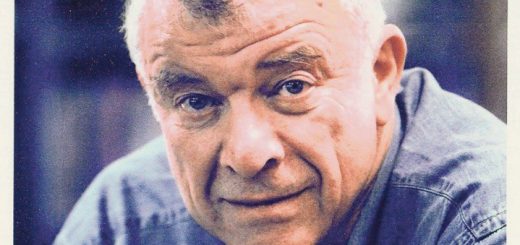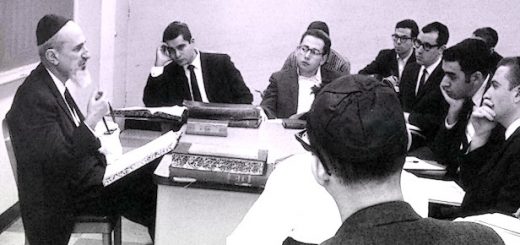From The Mouths of Ministers

“Tonight I humbly ask forgiveness of the Jewish people for every act of anti-Semitism and the deafening silence of Christianity in your greatest hour of need during the Holocaust.”
Those words were spoken before a crowd of several thousand Jews attending an AIPAC Policy Conference in March, 2007. The speaker was Pastor John Hagee, the evangelist who heads the group Christians United for Israel – the very same Pastor Hagee whom Reform Rabbi Eric Yoffie now accuses of “insult[ing] the survivors” of the Holocaust.
Rabbi Yoffie, president of the Union for Reform Judaism, was referring to a speech Pastor Hagee made about a decade ago, about Jeremiah’s prophecy that G-d would one day “bring the Jewish people again unto their land that I gave unto their fathers” (16:15). In the next verse G-d proclaims that He will send “many fishers” and then “hunters.” The latter word was interpreted by Mr. Hagee as referring to Hitler, leading the pastor to regard the Holocaust as part of a Divine strategy to move Jews to the Holy Land.
One needn’t agree with the pastor’s take on history; or accept his assumption that simple people can identify events with prophecies; or even consider him to be in command of the facts (in his speech, he has Theodore Herzl, a resolutely secular Jew, invoking Divine command as the reason Jews should move to Palestine). But nothing in fact could be more Jewish than to accept that, no matter how inscrutable, G-d is just; and that as we look into the maw of tragedy we are to look inward as well.
And so, while the Reform rabbi may have seen the Christian minister’s words as “an affront” to those who perished in the Holocaust, I saw only an attempt, imperfect but without malice, to discern the fulfillment of a Jewish prophet’s words in recent history.
It is possible that Rabbi Yoffie’s harsh judgment of Pastor Hagee’s sermon reflects a broader disconnect between the two gentlemen. The Reform leader has long disdained the pastor’s politics. Hagee, after all, is a social conservative, believes that Iran should be militarily disabled and strongly opposes a two-state solution to the Israel-Palestinian conflict. As such, his position profile is something of a reverse image to that of the Reform movement.
The Jewish clergyman might also have resented the Christian one’s reference, earlier this year at a Reform temple in Los Angeles, to the object of Christian veneration as “a Reform rabbi” (intended as a compliment, no doubt).
But one suspects that what most profoundly divide the two clergymen are issues of theology. It is the pastor’s belief, but apparently not entirely the rabbi’s, that: The Torah is the word of G-d (“Truth is not what you think it is. Truth is what the Torah says it is”); G-d chose and charged the Jewish People with heeding His laws (“[The Jews are] the chosen people, a cherished people… with an eternal covenant that will stand forever”); and the Torah explicitly warns us of the repercussions of forsaking our mission.
That latter thought is in fact recalled at each Jewish festival, when Jews include in their prayers the words “Because of our sins were we exiled from our land…” It is, moreover, the dominant motif of the liturgy of the annual Jewish mourning-day, Tisha B’Av.
As it happened, the very Sabbath following Rabbi Yoffie’s rebuke of Pastor Hagee, Jews the world over read one of the two portions of the Torah that relate how the Jewish People’s refusal to honor their holy mission will result in the loosening of the reins holding evil at bay. The paragraphs speak of punishments so terrible they are read in an undertone. But they nonetheless must be read, audibly and carefully, because they speak to most important Jewish fundamentals: that the Torah’s laws are real, and that it is built into the very fabric of the world that the Jews must heed them. Those who do evil, Pharaoh, Hitler, et al, are fully culpable for their acts – “Merits are brought through the meritorious,” says the Talmud, “and iniquity through the iniquitous” – but calamity is not causeless.
It would appear that Rabbi Yoffie does not accept these truths. He believes, as he has written, that Jews “must examine each mitzvah [Torah commandment] and ask the question: ‘do I feel commanded in this instance…?’”
Thus, at a recent Reform convention, he could disparage what he called “the Shabbat of eighteenth-century Europe… an endless list of Shabbat prohibitions,” and proudly recall how “we fled that kind of Shabbat, and for good reason.”
Many of us Orthodox Jews tend to not be comfortable with Christian evangelists. Most, after all, want Jews to accept Christianity, which a Jew is enjoined against doing, even on penalty of death. Although Reverend Hagee has clearly stated that he has no such designs, he nonetheless remains a Christian evangelist. And for Biblical interpretations, we Jews look elsewhere.
At the same time, though, an inescapable irony emerges here:
Interpretations of Biblical prophecies aside, the pastor’s approach to Torah (that it is true), Jews (that they are chosen to serve G-d) and history (that it is Divinely guided) is the Jewish one; and the rabbi’s, tragically, is not.
© 2008 AM ECHAD RESOURCES
[Rabbi Shafran is director of public affairs for Agudath Israel of America.]




“the pastor’s approach to Torah (that it is true)”
This is not correct. Christians rejected the Oral Torah early in their history and continue to do so.
I think it was Rav Dovid Gottlieb in one of his lectures who noted that, on a strictly ideological basis, an Orthodox Jew has far more in common with an Evangelical than he does with a Reform Jew. Eric Yoffie seems determined, through action and speech, to prove this.
It is not only pastor Hagee’s approach to Torah which is more Jewish–his stand with Israel is far preferable to the Jewish left and his love of the Jewish people is a clear compliment and a blessing. The fact that he is Christian means he has a different theology which can have sure striking differences with Torah Judaism. Please understand how this Christian weighs and balances what he cherishes about Judaism vs. what he might find reason to contrast.
His public stands are so greatly tilted towards how he loves Israel and the Jewish people–this is the best possible outcome under the circumstances. Indeed, it is precisely the inclination to judge to the positive and de-emphasize differences that is a model of good character.
Rabbi Shafran is correct to note that the Reform leader is not comfortable with the truths of the Torah. It is also apparent Yoffie is not comfortable with someone else expressing unconditional love and support for the state of Israel and the Jewish people.
It is ironic that the current leader of RJ, which was built on imitating the liberal Protestant segments, viewed no mitzvos as binding, which was anti Zionist until the middle of WW2 and which did nothing against the Shoah, lectures a friend of Israel in such a manner. We tend to forget that theodicy based “answers” about the Shoah and all types of theological responses from Satmar to RZ to RYBS are a strong part of the Torah tradition. We may not agree with all or some of these responses, but they are rooted in Tanach and part and parcel of every Musaf on Yom Tov.
“Tonight I humbly ask forgiveness of the Jewish people for every act of anti-Semitism and the deafening silence of Christianity in your greatest hour of need during the Holocaust.”
I am having a real difficult time trying to understand this plea. How does this work with Christians and Jews today ?
Deafening silence ?
I ask the Pastor: Didn’t Christians save Jewish people during the Holocaust? Didn’t Christian men and women volunteer to fight these evil empires during WWII and with great loss of life ? Didn’t many Christian nations offer refuge because it was the right thing to do ? Granted outside of Denmark, Sweden and England (Kindertransports) there was hardly a national response. Yet, G-d did prevail in the hearts of men and women as individuals and the Jewish people are alive and strong today as a testament of His great love.
Don’t many Christians today have a genuine love for the Jewish people because of an even greater awareness of all the gifts they have given us ? Don’t many Christians today support Israel ? Don’t many Christians today recognize that the Jewish people are G-d’s chosen ? Don’t many Christians today pray for the peace of Jerusalem ? Don’t many Christians today study the very Words of G-d that the Jewish people revere – the Hebrew Bible. Don’t many Christians today even learn Hebrew individually and in seminaries to better understand the Word ? Don’t Christian scholars search out Jewish commentaties and texts to gain greater understanding ?
The answer is yes on all accounts. Not because we are so righteous but because G-d is so good.
Tell me how far back does one go for generational sins ? Did G-d intend forgiveness to work this way ? I thought I was responsible for my own sin as a result of generational sins of my relatives.
As a Christian, I know I need to take a spiritual inventory of myself often and offer forgiveness to those who hurt me (morally and deeply) and make amends to those whom I have harmed as a result of past sin in my life. Notice the operative word is “I” as in there is a very real connection of me and my sin before G-d.
To ask for forgiveness for the sins of others in times past, to me, is like blindly refusing to recognize that G-d was/is an active participant in the history of mankind and in the process of sanctification in the life of His children – today…..as well as in the past. G-d alone is the ultimate Judge and Deliverer of wrath against the unrepentant/unrighteous as well as the loving Father and Revealer of sin in the righteous.
Did Jacob offer forgiveness to Egypt for their sins over 400 years in the time of Moses ? NO ! G-d Himself delivered Israel and punished Egypt. The G-d of Moses and of Jacob has not changed.
To ask Jewish people to forgive the sins of others from long ago past doesn’t work for me and I cannot understand how it can work for you.
Neither R. Yoffie nor Pastor Hagee believe in the Oral Torah as a Torah from Hashem. However, where R. Yoffie believes that Hashem will never break His covenant with the Jewish people and will protect and redeem them, Pastor Hagee believes that Hashem has a new covenant and that the Jews will either become Christians, c”v, or be destroyed utterly. With friends like these…
It is disingenuous and dishonest to talk about contemporary Reform Judaism as if it were the same entity it was over 100 years ago. There has been a monumental turnaround in the Reform position on Zionism and Jewish education (if not the full obligation of mitzvot) since the 1960s. Furthermore, until the middle of WW2 there were plenty of other Jewish groups that were also ambivalent about Zionism and activism to prevent the Shoah. Steve Brizel would be better served by addressing specific issues with the Reform movement today, instead of tilting at irrelevant anti-Zionist windmills of yesteryear.
Rabbi Shafran misrepresents Rabbi Yoffie and Reform Judaism. Consider for example when Rabbi Shafran says that Rabbi Yoffie has written that Jews “must examine each mitzvah [Torah commandment] and ask the question: ‘Do I feel commanded in this instance…?’ ”
Here is the quotation again (from Commentary magazine, August 1996) with more detail: “The heart of Torah is mitzvah–the individual divine command. … Torah was transmitted to Moses and his spiritual descendants–the prophets and rabbis who fashioned our tradition and passed it on to subsequent generations. But in recording divine revelation as they experienced it, they did so as fallible human beings … I will seek guidance from rabbis and teachers, but ultimately I must examine each mitzvah and ask the question: do I feel commanded in this instance as Moses was commanded? …”
Rabbi Yoffie is continuing a long tradition of studying and questioning and searching for the Torah’s meaning.
If you read the rest of Rabbi Yoffie’s statement in Commentary you will find that his beliefs, while certainly not Orthodox, are quite different from what Rabbi Shafran alleges.
My understanding was that the large majority of Orthodox rabbis were anti-Zionist until well after World War II, and that Agudath Israel still is today. Am I incorrect?
Re Dr. Hall, (9): not being pro-Zionist doesn’t make one anti-Zionist.
Maybe I’m just uncomfortable with the prefix “anti”, vs. say, “non.”